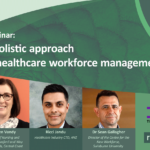GPs think so, but the decimation of primary care research over the past five years makes it hard to know.
Talk to any GP or listen in to online forums and you will hear stories about themselves or colleagues and friends leaving the profession, reducing their hours or retiring early, particularly if they happen to be female.
But are there any hard numbers to back up the anecdotal evidence?
For the most part the answer is no, not necessarily because the stories aren’t true, but because the data just doesn’t exist. Like many things about general practice, research into what GPs do, how they feel about it and what their plans for the future are, has been sadly neglected since the 2018 closure of the country’s two biggest primary care research projects – BEACH and MABEL.
The RACGP’s Health of the Nation 2022 report is the most recent set of data available. Here’s what it has to say about GPs’ career plans:
“With the existing challenges of being a GP now compounded by the pressures of covid-19 and other recent natural disasters, the proportion of GPs considering imminent retirement has increased significantly in 2022.
“One-quarter of those who responded to the survey stated that they plan to retire within the next five years, an increase from 18% in 2021. In real numbers, that is more than 7500 GPs. This will worsen already worrying workforce projections that predict a deficit of 11,517 GPs by 2032.
“Unsustainable workload and burnout among the profession is contributing to early retirement.
“General practice clinics are already affected by this general practice exodus, with an increasing proportion of practice owners reporting that sourcing and retaining GPs is a key challenge. This year 70% of practice owners have indicated they are concerned about the ongoing viability of their practice, an increase from 54% in 2021.”
Deloitte had this to say in May 2022:
“Demand for GPs is estimated to grow between 2021 and 2032 by 38.5%. Demand for GPs in major cities is projected to increase by 47.0% by 2032, while demand in regional and remote areas is projected to increase by 17.6% in the same period.
“Demand for GP services is forecast to outpace supply – resulting in a widening shortfall of FTE GPs from 2022 onwards. This shortfall is expected to reach 11,392 GPs (FTE) – that is, 27.9% of the workforce – by 2032.”
But things have changed even since November 2022 when the RACGP’s report was released – two more waves of covid, false claims of GPs defrauding Medicare in ridiculous numbers by implausible amounts, and a Federal Budget which at least started to address some the financial viability of general practice.
“Since the Budget you would expect that chatter about GPs leaving the profession would have decreased, because the budget is putting more money into the sector, in certain specific ways,” said Professor Anthony Scott from Monash University’s Centre for Health Economics, one of the project leaders on the MABEL project.
“It’s unclear how that’s changed people’s decision-making and their [career trajectories].
“We need quality, longitudinal data to either support or refute the rhetoric,” he said.
Since the demise of BEACH and MABEL, and the closure of the Australian Primary Care Research Institute in 2015, research into primary care has been a matter of finding ways to link data from the ABS, MBS, PBS and other sources – none of which ask exactly the right questions about what GP careers look like.
“The value of longitudinal data is so important, because you can look at changes over time,” Professor Scott told TMR.
“The NHMRC stopped funding MABEL because we were asking the same questions every year and so they thought there was nothing new in it.
“The data is there to create a national dataset on primary care providers and some data on patients, but it is not linked. That linkage is so important.”
In a 2022 commentary in the International Journal of Environmental Research and Public Health, Professor Scott and colleagues noted that BEACH was considered a “gold standard” for consistent reporting of primary care research.
Interoperability remains the big barrier, should a BEACH-like program be resurrected, they wrote.
“There are now at least eight brands of electronic health records (EHRs) currently used in Australian general practice.
“Interoperability of data requires standard approaches to data design structures, data field names and their associated definitions, and the coding and classification of relevant data fields. Standardisation is required.
“All of the GP EHRs used in Australia have been developed independently, which limits such interoperability and the ability to generate meaningful data from general practice EHRs, both for clinical and statistical purposes,” they wrote.
In an ideal world, with money no object, Professor Scott has a clear idea of what he would want to see.
“I would want a dataset of GPs from graduation to retirement, which has their own background characteristics, information on their motivations, their family background,” he said.
“We would follow that over time, look at how those factors change over time. GP wellbeing is important.
“We would then be able to link that to the patients that they see – what patients they’re seeing, and changes in those patients’ characteristics over time.
“It’s a big task to do that.
“But right now there are two kinds of datasets, which are kept separate.
“There is data on patients – the demand side of healthcare – there are lots of studies linking to medical data on patient level data, which is very important for epidemiology purposes, and trying to work out what’s happening to patients.
“Then there’s data on the GPs themselves, which is the National Health Workforce dataset.
“These two things aren’t connected, partly because the profession in some ways doesn’t want them to be connected, because it might reveal things that they don’t want to necessarily see, that [they think] might be used against them.
“Those two things are very hard to link. But from a research perspective, to find out what drives the health of patients and the role of doctors in doing that, we need that kind of evidence,” he said.
“GPs don’t want to be performance managed, and there are accountability issues as well, so there are lots of difficult issues around making that link between these two datasets.
“But if it were done in in a controlled way, where independent researchers can access this data to address defined research questions, then I think that would be fine. “It’s done in other countries. Just not here.”





